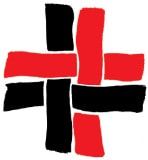By now (11am on Friday morning), a significant proportion of the 50 million or so cases of Beaujolais nouveau which left the villages of Beaujolais at midnight will have arrived in the UK, and a fair amount will have reached Warwickshire. None of it will cross the threshold of Wilde’s.
This is not wine snobbery. This is a considered judgement.
Despite my occasionally vehement advocacy of the superiority of certain wines over others, I have only once been accused of being a wine snob. It was a party, some time ago. We were in the kitchen. A glass of red was thrust into my hand and it was clear that the wine was corked before I had taken a sip. As I put down the glass with an exclamation of disgust, a voice said: “Oh God, a wine snob.”
I was mortified, because I’m not: I would happily have drunk the offending wine had it not been corked. I was also surprised, because my accuser was an artist named Mary Riley, who was known for her trenchant views on art and artists. I tried to engage her in a discussion about one’s right – indeed, duty – to distinguish the good from the bad in all fields of human endeavour: art, literature, music, food, wine etc etc. But no. Some painters are better than others, some writers are better than others, some composers are better than others, but wine is wine. It is either red or white. (Kingsley Amis claimed that “Red or white?” was the most depressing question he was ever asked at a dinner party.)
The writer Rick Gekoski tellingly used a wine analogy when discussing the process of judging the Booker prize:
“You like Mateus Rosé better than Chateau Pétrus? No problem. You think it is a better wine? You're wrong. You're clearly without the experience, palate, or discrimination to make such a judgment.“
Rick went on to quote the Eliot phrase “the common pursuit of true judgement”, which was famously appropriated by Leavis, and is close to my heart. The importance of the common pursuit, and the collaborative process which it involves, is what I took from my education and what I believe is relevant and applicable today. Yes, even to wine.
One of the pleasures of our ownership of Wilde’s has been working with merchants, customers, staff and friends to select wines which satisfy taste and judgement (as well, of course, as commercial considerations). An even greater pleasure has been the creation of a wine list which attempts to explain those choices and to involve the reader/customer in the choice itself.
That process has been an education for which I am grateful to mentors such as Tim Hollis-Carroll. There are wines on the list which are not to my taste. But there is not a single wine which I do not judge to be one of the best of its kind, in its price range.
Which is why we will not be offering Beaujolais nouveau today. True, it is not to my taste. But more importantly, it is neither a good wine nor good value for money.
And if I have learned one thing in a lifetime of drinking wine, it is this: if it is not the former, it cannot be the latter - whatever the price. Can we not agree on that?
Today’s listening: gearing up for the Dylan gig in Hammersmith this weekend with the Rolling Thunder Review from Boston in November 1975.





 RSS Feed
RSS Feed